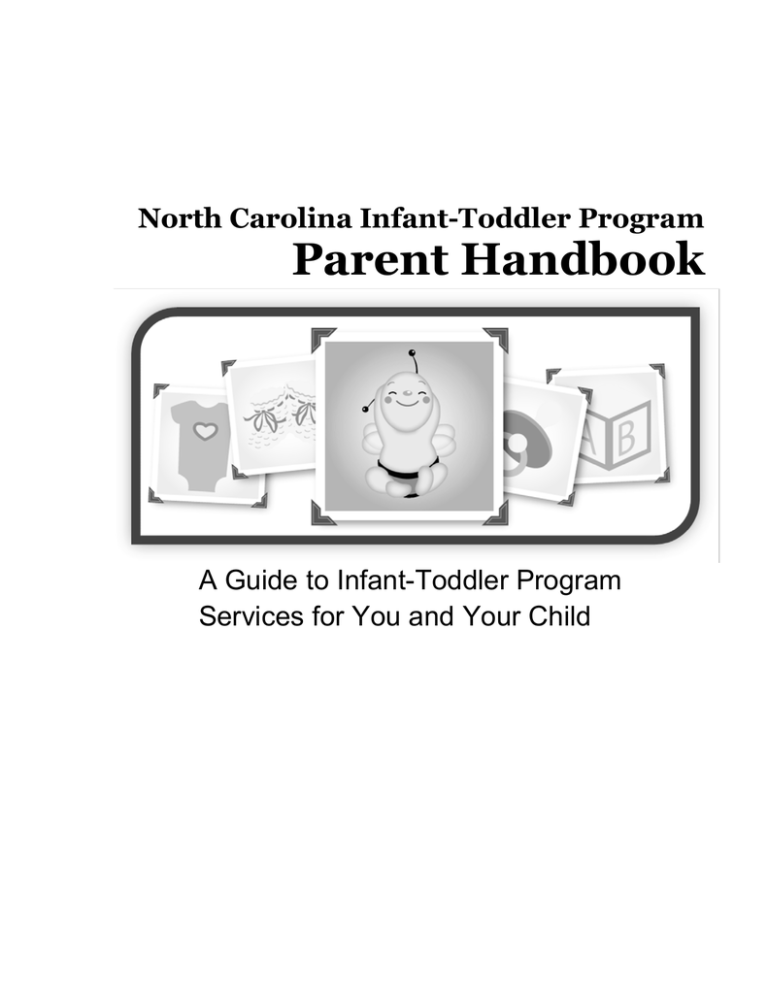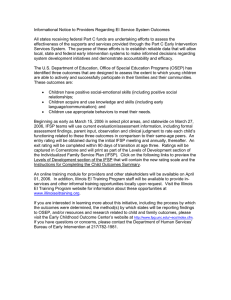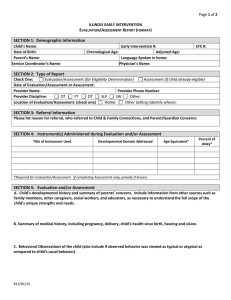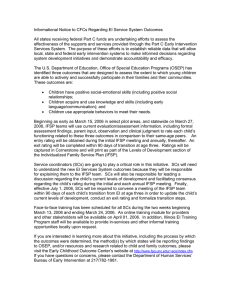Parent Handbook North Carolina Infant-Toddler Program A Guide to Infant-Toddler Program
advertisement

North Carolina Infant-Toddler Program Parent Handbook A Guide to Infant-Toddler Program Services for You and Your Child North Carolina Division of Public Health What is the North Carolina Infant-Toddler Program? Every family wants their child to grow and learn to his or her fullest potential. Having concerns about your child’s development may be a new experience for you as a family and this can seem overwhelming. There will be new people to meet and new words and terms to understand, but you are not alone. It’s important to remember that there are supports in place to help this be a positive experience for your child and family. The Infant-Toddler Program is voluntary. Parents may choose to proceed at their own rate, stop eligibility determination, or withdraw from the program at any time. The Individuals with Disabilities Education Act (IDEA) is a federal education law that helps to reinforce the importance of early development and learning in young children. Part C of IDEA ensures that early intervention services and supports are available for infants and toddlers, birth to age three, with disabilities and their families. In North Carolina, the Part C system of IDEA is called the Infant-Toddler Program. The Infant-Toddler Program is a system of coordinated supports for families to help you meet the developmental needs of your child. The lead agency for the North Carolina Infant-Toddler Program is the Early Intervention Branch of the Women’s and Children’s Health Section in the North Carolina Division of Public Health. In your community, the children’s developmental services agencies (CDSAs) administer, supervise, and monitor programs and activities for the Infant-Toddler Program. There are 16 CDSAs across the state that provide access to Infant-Toddler Program services. This network of CDSAs serves all 100 counties of North Carolina in single or multi-county catchment areas. The hopes and dreams for children are found in the hearts of their families. The family makes a lifetime investment of time, emotions, and finances. Early Intervention helps families make those dreams a reality. Page 1 North Carolina Infant-Toddler Program Parent Handbook (2013) What are the principles of the Infant-Toddler Program? Families know and understand the needs of their children better than anyone else. The Infant-Toddler Program values and considers the role of the family as a key to the success of early intervention. For this reason, the family needs to be a true partner with members of the early intervention team. Children are best supported within the family, and the family is best supported within the community. Intervention activities that fit into your daily routine are more likely to give you the results you want for your child and family. • • • • • • A child should be viewed as a child first, rather than a “special needs” child. Just as children and families grow and develop, supports and services should also change to meet their needs and choices. Early intervention is most beneficial when families are supported in meeting their children’s needs within the context of typical family activities and routines. Children with special needs are best served in settings that are used by all children. Family beliefs and values are important and are to be honored, as is the cultural (religious, ethnic, and racial) background of the family. Teamwork among families and service providers is important for planning early intervention supports and services. Who is Eligible to Receive Services from the Infant-Toddler Program? Your child and family may receive Infant-Toddler Program supports and services if your child is younger than age 3 and your child meets criteria for one of the two eligibility categories described below. Category I. Developmental Delay The stages that infants and toddlers go through are made up of different skills, such as walking and talking. These skills, or developmental milestones, usually happen by certain ages. Most children develop skills in a predictable order. They crawl before they walk and they point before they use words to tell you what they want. However, it is important to remember that every child develops in his own style and at his own pace. The Infant-Toddler Program considers a child to have a developmental delay if he or she is considerably behind other children of the same age in one or more of the following areas: • • • • • Cognitive Development - thinking and learning skills Physical Development - moving, seeing, hearing and health Communication Development - understanding and using sounds, gestures, and words Social-Emotional Development - responding to and developing relationships with people Adaptive Development - taking care of oneself when doing things like feeding or dressing Your child's development will be assessed through a variety of ways including observation, parent report, and evaluations and assessments by qualified developmental professionals. Evaluations and assessments are individualized to address the unique needs and concerns of your child and family. Category II: Established Condition A child is considered to have an established condition if the child has a diagnosed physical or mental condition which has a high probability of resulting in developmental delay. Examples include certain genetic disorders, neurological disorders, severe prematurity, vision impairment, hearing loss or autism. (The above descriptions are summaries and not a complete definition of the eligibility categories. You can get more information by asking your Early Intervention Service Coordinator at your CDSA or from www.beearly.nc.gov.) Page 2 North Carolina Division of Public Health How is my Child’s Eligibility Decided? When your child is referred to the N.C. ITP, eligibility can be determined in two ways: 1. A child‘s medical or other records may be used to establish eligibility (without conducting an evaluation of the child) if those records indicate that your child has a developmental delay or established condition that would meet the state’s eligibility criteria. 2. If your child’s eligibility cannot be established through a review of medical or other records, an evaluation will be conducted to determine your child’s eligibility for the program. Evaluations are conducted by qualified personnel and include the involvement of two or more separate disciplines or professions. In conducting an evaluation, a single procedure cannot be used to determine a child’s eligibility. Therefore the evaluation of your child will include the following: • • • • Administering an evaluation instrument. Interviewing parent(s) to obtain child’s medical and developmental history. Identifying your child’s level of functioning in the developmental areas of cognition, communication, social-emotional, adaptive, and physical development which includes vision and hearing. Gathering information from other sources such as other care-givers and medical providers, if necessary, to fully understand your child‘s unique strengths and needs, and reviewing medical, educational or other records. Child assessment and a family-directed assessment are completed for all eligible children prior to the development of the Individualized Family Service Plan (IFSP). There is more information about the IFSP later in this handbook. These assessments are conducted in order to identify your child‘s unique strengths and needs and the early intervention services appropriate to meet those needs and your family’s resources, priorities, and concerns as related to enhancing your child’s development. What is an Early Intervention Service Coordinator? An Early Intervention Service Coordinator is your main contact in the North Carolina Infant-Toddler Program. The coordinator will work with you to find supports and services to meet your child and family’s needs. Most families begin working with an Early Intervention Service Coordinator as soon as their child is referred to the Infant-Toddler Program. Federal and state laws require that children and families served by the Infant-Toddler Program have an Early Intervention Service Coordinator. Your Early Intervention Service Coordinator Can Help You: • • • • • • • • • • Understand your rights under the N.C. Infant-Toddler Program Decide about your child’s needs, your choices for supports and services, and the ways of getting those supports and services. Find supports and services as outlined in your family’s Individualized Family Service Plan (IFSP) and assure the provision and quality of those services. Find answers to questions you have about your child. Talk with other specialists involved with your child and family. Decide what supports and information you want, how much you want, and how you want to receive them. Find resources which may be helpful for your child and family. Plan when things need to get done and decide who should do them. Plan for changes in services by talking about options, visiting new programs, and making plans to prepare everyone for the change, including transition planning for services when your child reaches age three. Settle any disagreements with your early intervention team about things like eligibility for services, types of services, and fees for services. Page 3 North Carolina Infant-Toddler Program Parent Handbook (2013) What is an Individualized Family Service Plan (IFSP)? The Individualized Family Service Plan, or IFSP, is your family's written plan for the Infant-Toddler Program. It describes how you and your early intervention team will work together to address the needs identified for your child and family. The IFSP is family-centered. This means that you will be an active team member and the key decision maker in the IFSP. The IFSP is based on information from your child’s evaluation and from the concerns, resources, and priorities that you identify. Like a road map or travel itinerary, the IFSP shows where you are going (child and family outcomes or goals), how and when you might get there (services and projected time lines), and who will be going with you for support (service providers, family, friends, and/or other community supports). Your Early Intervention Service Coordinator is responsible for explaining the IFSP to you. He or she will make sure the IFSP is written and will answer any questions you have. Your signature on the IFSP shows your participation and your agreement with the plan. However, if you disagree with all or part of the IFSP, you have the right to share your concerns and ask for changes. You may accept or refuse any or all services suggested to you. You may stop a service anytime you wish. A copy of the IFSP must be given to you after it is completed and signed. The written IFSP is reviewed every six months. However, your needs and resources may change more frequently. You can request an update or review of your IFSP at any time. Who Will be Involved in Developing our Family’s IFSP? You and your IFSP team will work together to develop your plan and to agree on any services and supports that will best meet the needs of your child and fit in with your family’s routines. The people who must be involved are: • You (one or both parents, guardians, foster or surrogate parents) • Your Early Intervention Service Coordinator • Members of your evaluation team • As appropriate, the providers of early intervention services for you and your child You may invite other people to be on your IFSP team, such as other family members or an advocate or person outside of your family. What Services are Available to My Child and Family? A variety of supports and services are available through the Infant-Toddler Program. Some are required services. This means that Infant-Toddler Program must make them available if they are included on your IFSP. Required services include: Psychological Services Service Coordination Services Sign Language and Cued Language Respite Services Social Work Services Special Instruction Speech-Language Pathology Services Transportation and Related Costs Vision Services Assistive Technology Devices and Services Audiology Services Family Training, Counseling, and Home Visits Health Services Medical Services Nursing Services Nutrition Services Occupational Therapy Physical Therapy Page 4 North Carolina Division of Public Health Other services may be listed on your IFSP, but are not required by law to be provided by the N.C InfantToddler Program. Your Early Intervention Service Coordinator may help you locate and access these services. Examples of other services that are sometimes recommended are: • • • • Child Care Well Child Visits Genetics Counseling WIC (Women, Infants, and Children) Program Your Family’s Rights Please refer to the “Notice of Child and Family Rights” handbook, which will outline your rights, as well as explain that you are entitled to be notified of specific procedural safeguards under the N.C. Infant-Toddler Program. These procedural safeguards are your protection that you will be the key decision maker and that early intervention agencies will follow required procedures. What is Transition Planning? Your family may be content with the supports and services you and your child receive through the InfantToddler Program. As your child approaches age three, it may be hard to think about a change or transition. Transition planning is an ongoing process and happens in many different ways, such as through informal discussion and scheduled meetings. Your Early Intervention Service Coordinator will guide you through the transition planning process and will facilitate the development of a written Transition Plan to be included in your family’s IFSP. Transition planning activities include: • Discussion and information gathering about options for future placement, services, and supports in your community. • Help in preparing you and your child for changes in services. • Providing information about your child (such as evaluation and assessment reports, and IFSPs), with your written consent, to other service providers. Page 5 North Carolina Infant-Toddler Program Parent Handbook (2013) The Infant-Toddler Program Step-by-Step This is an overview of the steps your family may take while in the Infant-Toddler Program. First Steps: Getting Started Referral ● Anyone, including a parent, having concerns about your child may refer him or her to the Infant-Toddler Program. ● Referrals may be made by telephone, fax, in writing, or in person to the local CDSA. ● When the referral is received, an Early Intervention Service Coordinator will be assigned to assist your family. 1 Initial Contacts ● During your initial contacts with a service coordinator and other CDSA staff, you will be asked about your child, his or her development, and medical history. ● These first meetings will help us learn your concerns and priorities as a family, your child’s current strengths, and areas needing improvement, as well as successes and challenges you may encounter during daily routines. 2 Evaluations and Assessments ● In order to determine if your child is eligible for InfantToddler Program services, an evaluation of your child’s current abilities may be completed. ● The information gathered through an assessment will show us your child’s strengths and any areas of development that might benefit from early intervention support. 3 Next Steps: Services Individualized Family Service Plan (IFSP) ● Once your child is determined eligible for the Infant-Toddler Program, a service coordinator will guide the development of an IFSP. ● Development of the initial IFSP must occur within 45 days of the referral. 4 Delivery of Services ● Your child will receive the services as outlined in the IFSP. ● Services listed in the IFSP should begin no later than 30 days after the IFSP is developed and signed by the family. Parents may choose to proceed at their own pace, stop eligibility determination, or withdraw from the program at any time. IFSP Reviews 6 Future Steps: Leaving the Program ● As the needs of your child and family change, supports and services may also need to change. ● The IFSP will be reviewed at least every six months to make sure it still fits your priorities and your child’s and family’s needs. ● You can request an update or review of your IFSP at any time. Transition 7 ● Children transition out of the Infant-Toddler Program when they are no longer eligible for the program or when they turn three years of age. ● Transition plans are outlined in the IFSP. Page 6 North Carolina Infant-Toddler Program State of North Carolina N.C. Department of Health and Human Services Division of Public Health Women’s and Children’s Health Section Early Intervention Branch www.ncdhhs.gov www.publichealth.nc.gov www.beearly.nc.gov Permission to Reproduce is Granted April 2013 The Department of Health and Human Services does not discriminate on the basis of race, color, national origin, sex, religion, age or disability in employment or the provision of services.



